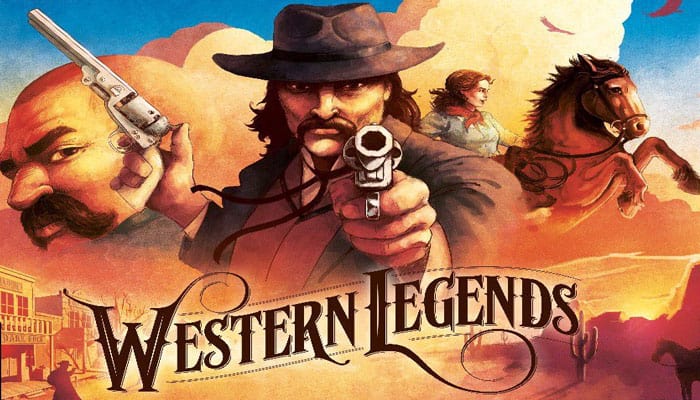
Western Legends is a "sandbox" game where players take on the roles of historical figures from the Wild West. Through a number of means in the game, players will earn Legendary points (LP).
Some players will become outlaws, collecting Wanted points for robbing the bank, rustling cattle, and stealing from other players.
Others will follow the path of the Law, earning Marshal points for fighting bandits, wrangling cattle, and arresting Wanted players. Only one thing is for certain: history only remembers the most legendary.
Components

- 1 game board
- 6 player mats (2-sided)
- 12 scoring cubes
- 12 story discs
- 2 prospecting dice
- 36 gold nuggets
- 6 wound tokens
- 1 end of game marker
- 16 cattle tokens
- 18 legendary tokens
- 1 first player token
- 6 player aids
- 12 character cards
- 40 story cards
- 52 poker cards
- 11 Man in Black cards
- 48 goal cards
- 54 money cards
- 6 player minis
- 1 Sheriff mini
- 6 bandit minis
- 1 General Store stand
- 13 fight cards
- 54 item cards
Setup

1 Place the game board in the middle of the play area.
2 Place all money cards in the 2. designated area on the right side of the board.
3 Place all item cards in the 3. General Store stand near the board.
4 Shuffle the poker cards and place them in a deck near the bottom right corner of the game board.
5 Discarded poker cards will go 5. face up in a pile to the right of the poker card deck.
6 Place the cattle tokens on the Ranch spaces of their corresponding color face down so their values cannot be seen.
7 Place the Sheriff in the Sheriff's Office space located in Darkrock.
8 Place the two prospecting dice 8. and supply of gold nuggets in the bottom right corner of the board.
9 Each player takes a player . mat, all scoring cubes, and all story discs of one color. For the standard game, use the side of the player mat without spaces for legendary tokens.
10 Each player places their wound token on the 0 space of the wound tracker on their player mat.
11 Each player draws 2 character cards, chooses 1, and returns the other to the box. The most Wanted player takes the first player token.
If players are tied for most Wanted, or no player is Wanted, then choose another method to determine who takes the first player token.
12 In player order, each player chooses a mini and snaps the plastic base of their color onto their chosen mini.

In this setup, Billy is the most wanted character starting with 2 wanted points.
13 Each player gains all starting items, money, poker cards, and Marshal points or Wanted points listed on the back of their character card.
Place any items, mounts, and weapons listed on the back of a player's character card in their respective area on their player mat.
Each player will place their mini in the space listed under "Starting Location" on the back of their character card. If a player's starting location is a general store or saloon space they may choose any of the 3 spaces connected to the listed general store or saloon.
Each player will place their 2 discs next to the Story Card decks.

14 If a player chooses a character with Marshal points or Wanted Points, they place one scoring cube on the corresponding track. Marshal and Wanted points gained in this way do not grant any immediate rewards.
If a player chooses a character without Marshal or Wanted points then they'll place their scoring cube next to the left side of the board.
15 Each player places one scoring cube on the 0 space of the LP track.
16 Shuffle the story cards together and place them face down on the board in two approximately even decks on the spots marked story cards.
17 Place 1 bandit mini on each Bandit hideout location that does not already contain a player mini.
18 Shuffle the fight cards and place the deck near the top right corner of the game board.
19 Give each player a player aid.
Note: It is highly recommended that, if any players are wanted players at the start of the game. Those players be seated next to eachother in clockwise order. Further, the first player token will remain with one player throughout the game.
Characters
Each character in Western Legends has a number of unique elements which help define how they will play the game. Character cards have the following elements:
Starting location: this is where the character begins the game on the board.
Starting bonuses: these are the advantages each character has at the start of the game. These include additional items, money, poker cards, and/or Marshal/ Wanted points.
Legendary ability: this is a unique advantage that the player gains after they have 5 or more LP.
Some legendary abilities modify specific actions, such as fights or prospecting for gold, while others are actions that only the character can take. The elements unique to each character are intended to provide initial strategies and choices for the players.
While some characters start the game as Marshals, they may decide that a life of crime is more suited for their aims. Inversely, a Wanted player can later join the Marshals after a night in jail.
Game Play
Players compete to secure their legendary status by finishing the game with the most Legendary points (LP). LP is primarily acquired through the completion of notable acts such as fighting with other characters, driving cattle, and completing story cards.

At the start of the game, player determine the length of game they prefer to play: Short (15LP), Average (20LP), or Long (25LP). Place the end of game marker on the chosen space of the LP track.
When a player has acquired LP equal to or greater than the amount set for game length, they trigger the end of the game. Each player, including the one who triggered the end of game, finishes the current round.
Starting with the first player, players will then take one last turn so that each player has taken an equal number of turns.Once all players have taken their final turn, final scoring is determined.

Each player's turn is comprised of the following three phases:
- Start of Turn Phase
- Action Phase
- End of Turn Phase
Note: While you never lose your weapons, you may only have one active at a time. You cannot switch weapons until the start of your next turn.
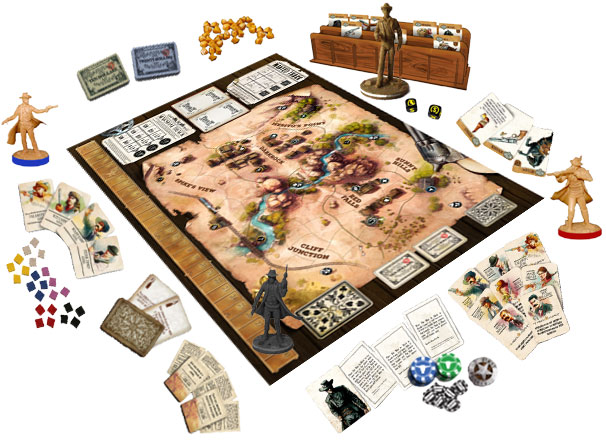
1. Start of Turn
During the START OF TURN phase, the active player carries out the following steps:
- Check for start of turn effects
- Choose one: Gain $20, draw 2 poker cards, or gain $10 and draw 1 poker card.
- Choose a weapon and mount for the turn
2. Action Phase
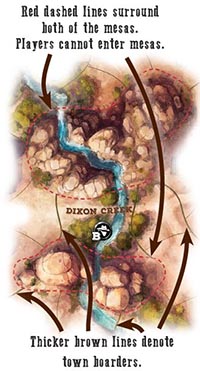
Each turn, the active player chooses three actions to perform from a variety of different options. They may perform the same action multiple times in a single turn, unless stated otherwise.
The possible actions a player can take on their turn are as follows:
- Move
- Use an Action on a Card
- Fight Another Player (arrest, Duel, or Rob)
- Take a Location Action
A. Move
Players can move up to their maximum movement with a single MOVE action.
- Players without a mount have a movement of 2.
- Players with a mount may use the mount's movement instead.
When moving, a player may move their mini into any space that is adjacent to their current space. The only exception to this are the two mesas which are surrounded by a red dashed line in the center of the board. Mesas are not considered spaces for movement.
Some abilities, goals, items, or other cards may refer to a player being in town or outside of town. Spaces are considered to be within town if they are located within the thick lines surrounding Darkrock and Red Falls. Outside of town is everything not in Darkrock or Red Falls.
B. Use an Action on a Card
Poker cards, item cards, and even some character cards which have the word "ACTION" printed on them can be used during this phase to take special actions otherwise unavailable to players.
Note: Not all poker cards have the ACTION effect on them. Some poker cards will have REACTION and others will have BONUS, neither of which require an action to activate.
When a player chooses to use the action on a card, they must do the following in order:
Place the card face up on the table and read the text out loud.
Carry out the necessary steps to complete the card's text.
If the action taken is on a poker card, then place it in the discard pile next to the poker deck. HOWEVER, if the action taken is on a character or item card, simply follow the instructions on the card.
C. Fight Another Player
(arrest, Duel, or Rob):
Fights are broken up into 4 steps, taken in order:
- Declaration
- Reveal
- Reaction
- Reward
I. Declaration
A player may only initiate a fight against another player in the same space. This player is referred to as the "target" player.
The active player must declare which type of fight they are initiating: Arrest, Duel, or Rob. Each type of fight offers a different reward.
To attempt an Arrest, the active player must already have at least 1 Marshal point, and their target must have at least 1 Wanted Point.
The active player then chooses 1 poker card from their hand and places it face down on the table. This is the card they will use in the fight.
The targeted player must now decide if they will fight or decline. If they fight, they also choose 1 poker card from hand and play it face down in front of them. This is the card they will use in the fight. If they decline, the active player immediately wins. In this case, skip to the Reward step.
II. Reveal
Both players simultaneously reveal their selected cards and resolve any Bonus effects (from characters abilities, items, weapons, and/or poker cards).
III. Reaction
Players may now use Reaction effects on pokers cards in hand. The active player has the first opportunity to use a Reaction. After the active player, the targeted player may then use a Reaction.
Continue this in this order until both players decline to play any further Reactions.
IV. Reward
The players in the fight receive penalties and rewards based on the type of fight chosen (Arrest, Duel, or Rob). The winner is the player that has the highest value card after effects are applied.
Values cannot be increased higher than the rank of Ace or decreased lower than the rank of 2. The active player wins any ties. Regardless of the type of fight, the player that loses the fight always gains 1 wound and draws 1 poker card.
Arrest (Marshal Players only) - If the active player wins, they gain 1 Marshal point. The Arrested player gains 1 wound, draws 1 poker card, and is placed at the Sheriff's Office space with the Sheriff. The Wanted player also lose all Wanted points, all cattle, and half their money and gold nuggets rounded up.
Duel - If the active player wins, they gain 2LP.
Rob - If the active player wins, they gain 1 Wanted point, and may choose to steal either half of the targeted player's money or half of their gold nuggets, rounded up. Additionally, they may also steal 1 cattle token from the losing player, if one is in their possession.
Note: If the target player declines a fight, the active player must still discard the poker card they chose during the Declaration phase.
Place all poker cards played during the fight into the discard pile next to the poker deck.
A player may only fight a specific player ONCE each turn. They may, however, initiate a fight against a different player as long as they have enough actions to do so.
Poker/Fight Card Values
When determining the winner of a fight, players will compare the numerical or face card value of their chosen card. The numerical cards can be determined by seeing which card has the highest number, while face cards follow the order J(ack) The full list of fight cards are: 2<3<4<5<6<7<8<9<10 Annie is in the same space as Bass Reeves and decides to use one of her three actions to fight him. Annie declares a Duel against Bass and chooses a poker card to play face down. Bass accepts the fight and chooses a poker card to play face down as well. Annie's ability forces the opponent to discard a card at the beginning of a fight, otherwise they gain 1 wound. Annie and Bass simultaneously flip and reveal their cards. Annie reveals a King, while Bass reveals a Queen. Bass's Upgraded Shotgun decreases the value of her poker card by 1, decreasing it to a Queen. Since Annie is the active player she wins the tie. Annie gains 2LP for winning the fight. Bass recieves 1 wound for losing the fight. Annie did not declare an Arrest or a Rob action, so nothing further happens to Bass. Annie cannot fight Bass again this turn. The majority of actions a player can take on their turn are at locations. To take a location action, a player must be in the space of the location. To take a location action at either of the General Store or Saloon locations, a player must be in one of the three neighboring spaces. The locations and their specific actions are listed below. While in a space neighboring a General Store, a player may spend an action to purchase and/ or upgrade any number of item cards, as long as they have enough money to do so. Some important information about items: A player may only possess a single copy of each item. When purchasing a mount or weapon, players may immediately choose it as their primary mount or weapon. To upgrade a mount or weapon, pay its cost again. While in a space neighboring a Saloon, a player may play a hand of poker. To do so, they spend an action, pay a $10 ante, and then draw 1 poker card. If any other players are in the same town, they may also choose to pay the $10 ante to draw 1 poker card and join--they do not have to be on a Saloon space. If no other players join the hand of poker, then the player to the right of the active player takes on the role of the "dealer", setting aside their current hand of poker cards, and drawing 4 poker cards from the deck as their hand. The Saloon always adds $50 to the ante(s) as a reward for winning, regardless of the number of players in the hand. After all players in the hand have paid their ante and drawn their cards, the top three cards of the poker deck are revealed. This is called "the flop". Players then make the best five card hand from the three revealed cards along with two more cards chosen from their hand. If a player has no cards when they ante they must play the 1 card they've drawn. For rankings of poker hands see the table below. The player with the best hand wins the $50 from the Saloon, as well as all antes. The active player will win any ties. If the active player wins, they also gain 1 LP. All losing players draw 1 poker card. If the dealer wins, they gain no reward. All cards played in the hand are then discarded (along with the the flop). If 2 non active players are tied in poker, split the pot + antes rounded down between those players, returning additional money to the supply if needed. While at a Mine space, a player may spend an action to prospect for gold. To do so, the player rolls both prospecting dice. The prospecting dice have four possible results: Gain 1 gold nugget Gain $10 Gain $10 and reroll the die, applying the next result as well Gain nothing Players can only carry a maximum of 4 gold nuggets. While at the Bank space, a player may spend an action to sell their gold nuggets. For each gold nugget sold players gain $20 and 1LP. Return those nuggets to the supply. Players can only ever carry a maximum of $120. Any additional money gained above this limit is lost. While at the Bank space, a player may spend an action to initiate a Heist. To do so, they must first fight the guard at the bank to succeed. The player to the right of the active player draws 3 fight cards for the guard and chooses 1 to play face down. The active player chooses 1 poker card from their hand and plays it face down. Both cards are revealed. Bonus effects from character's abilities, items, weapons, and the played poker card are applied. The active player may play any number of Reactions. The effects from the played fight card are applied. The highest value wins the fight with the active player losing all ties. If the active player defeats the guard, they gain $80 and 3 Wanted points. If the active player loses, they gain 1 Wanted point, 1 wound, and draws 1 poker card. Discard the played poker card(s) and return all fight cards to the bottom of the fight deck in a random order. While at the Doctor's Office, a player may pay $10 and spend an action to lose all of their wounds. They then draw 1 poker card for each wound lost in this way. While at the Cabaret space, a player may spend an action to gain LP. For every $30 they spend, they gain 1LP. D8 Acquire Cattle: Acquire: While at a Ranch space, a player may spend an action to gain 1 face down cattle token. Cattle gained are placed on that player's mat. Players may look at the reward on their cattle token at any time. Players may only acquire 1 cattle token at a time. Wrangle: After a player ends their move action at the Rail Station space, they may deliver their cattle token to gain 1 Marshal point and the reward listed on the back of the cattle token. This does not require an action. Delivered Cattle tokens are shuffled into their respective Ranch space. Rustle: After a player ends their move action at a Ranch of the opposing color, they may deliver their cattle token to gain 1 Wanted point and the reward listed on the back of the cattle token. This does not require an action. Delivered Cattle tokens are shuffled into their respective Ranch space. While at ANY location, a player may spend an action to gain $10. At the end of a player's turn, they take the following steps in order: Resolve all story cards with the requisite number of discs on them. Discard down to maximum hand size: 5 cards minus 1 card for each wound. If they are Wanted, gain LP based on which row they occupy on the Wanted track. If they have acquired LP equal to or greater than the amount set for the game this triggers the end of the game. Finish the current round. Each player will then take one more turn, including the player who triggered the end of the game. The next player in clockwise order becomes the active player and starts their turn. Story cards provide players with a thematic look into the world of Western Legends. During a player's turn, if they meet the requirements for one of the available story cards, then they may place 1 of their discs on it. The condition to trigger each story card is printed on the back of each card. Each story card requires a specific number of discs before it can be resolved at the end of a player's turn. The required number of discs depends on the player count of the game: A player may only add 1 disc to 1 story card on their turn. If the same requirement is on both available story cards, then the player chooses which story card to which they will contribute. Players may not contribute to story cards when it is not their turn. If a player has both of their discs on story cards and would meet the requirements to place another disc, they may choose to move 1 of the placed discs from the other story card. The player that contributes the last disc to resolve a story card carries out the following steps in order at the end of their turn: Read the narrative text aloud. Resolve the reward on the card for all players that contributed to the story card. Players that contributed more than 1 disc only gain rewards from the card once. Spawn bandits in all of the indicated bandit hideouts if any. Bandits cannot be spawned to a space already containing a player, the Sheriff, or another bandit. Move the Sheriff the indicated number of spaces (0-6)--this may cause an Arrest to trigger. If an arrest is triggered, the remaining movement is lost. While the Legendary track measures a player's overall status as a Western Legend, the Marshal and Wanted tracks measure their actions as either peacekeepers or outlaws. A player may never have both Marshal and Wanted points at the same time. Wanted players may never gain Marshal points. However, Marshal players may choose to forfeit all their Marshal points and become Wanted if the opportunity presents itself. Marshal points are awarded to players for keeping the peace. They can be earned in the following ways: When a Marshal player gains any amount of Marshal points, they move their cube on the Marshal track and gain the rewards listed on each space they move through or into. If a player reaches the 9th and final space of the Marshal track and would then gain any number of points that would push them past this limit, they gain 1 LP per point gained instead. A Marshal player may choose to become Wanted by taking an action that would result in gaining Wanted points. When doing so, they take their cube from the Marshal track and place it on the Wanted track. However, Wanted players may not become Marshal players in this way until they are Arrested and lose all Wanted points. Any time a player switches tracks, they start at the beginning of the new track, not from the same place they were on the other track. At the end of the game, Marshal players will score LP based on which row they occupy on the Marshal track. In this example a player has gained 2 Marshal points, moving them from the 1st to the 3rd space. The player gains $20 and 2LP. Note: Only players without wanted points may gain marshal points. Wanted points are awarded to players for their unlawful exploits. Players can earn Wanted points in the following ways: When a Wanted player gains any number of Wanted points, they move their cube on the Wanted track and gain the rewards listed on each space they move through or into. If a player reaches the 9th and final space of the Wanted track and would then gain any number of points that would push them past this limit, they gain 1LP per point gained instead. At the end of a Wanted player's turn, they gain LP based on the row they occupy on the Wanted track: 1LP for the 1st row, 2LP for the 2nd row, and 3LP for the 3rd row. At the end of the game, the most Wanted player will score 3LP (unless tied). Each other Wanted player scores 1LP. In this example the player has earned 1 Wanted Point. They immediately draw 1 poker card for reaching the 6th space. At the end of the player's turn they gain 2LP for being on the second row of the Wanted Track. Unlike the guard at the Bank, bandits and the Sheriff are represented in the game with minis. While very different, all three are collectively referred to as non-player characters, or NPC's, in the game. The difference between bandits and the Sheriff are detailed below. Player vs Bandits: There are three different gangs of bandits, each of which has two bandit hideouts outside of town. Bandits are only spawned on the board by resolving story cards (after their initial placement during setup). When a story card spawns bandits on the board, only spawn a bandit if the space does not already contain another bandit, a player mini, or the Sheriff. When a player enters a space with a bandit, their movement immediately ends and a fight is initiated. The active player chooses 1 poker card from their hand and plays it face down. The player to the right of the active player draws 2 fight cards for the bandit and chooses 1 to play face down. Both cards are revealed. Bonus effects from character's abilities, items, weapons, and the played poker card are applied. The active player may play any number of Reactions. The effects from the played fight card are applied. The highest value wins the fight, with the active player losing all ties. If the active player defeats the bandit, they choose to gain 1LP or 1 Marshal point. Wanted players may not choose to gain 1 Marshal point. If the active player loses, they gain 1 wound and draw 1 poker card. Remove the bandit regardless of the outcome. Discard the played poker cards and return all fight cards to the bottom of the fight deck in a random order. As long as there is at least one Wanted player, the Sheriff will move each time a story card that includes Sheriff movement is resolved. As long as there is at least one Wanted player, the Sheriff may also be moved with the action effect on the Manhunt poker card. Note: Wanted players may not enter the same space as the Sheriff. If the Sheriff enters the same space as a Wanted player, the Wanted player(s) must immediately discard 1 poker card, if they have any. If there are 2 or more Wanted players in the space as the Sheriff, the player that moved the Sheriff decides which player the Sheriff will attempt to Arrest. The Wanted player chooses 1 poker card from hand and places it face down. The player to the right of the Wanted player draws 4 fight cards for the Sheriff and chooses 1 to play face down. Both cards are revealed. Bonus effects from character's abilities, items, weapons, and the played poker card are applied. The active player may play any number of Reactions. The effects from the played fight card are applied. The highest value wins the fight, with the active player losing all ties. Discard the played poker card(s) and return all fight cards to the bottom of the fight deck in a random order. If the Sheriff successfully Arrests the Wanted player, they gain 1 wound, draw 1 poker card, and are placed at the Sheriff's Office space with the Sheriff. The Wanted player also loses all Wanted points, all cattle, and half their money and gold nuggets rounded up. If the Wanted player wins, they have successfully avoided capture. Place the Sheriff at the Sheriff's office, but gain no further rewards. Item cards are valuable tools that players will use to assist in their aims and exploits. Some item cards can even be upgraded, providing additional advantages and LP at the end of the game. There are three different types of item cards, which are explained further below: Mounts provide increased movement which allows players to travel across the board much more efficiently. Players may own more than one mount, but only a player's top mount is considered active during their turn. Mounts may be upgraded by paying their cost a second time at the General Store. Weapons provide bonuses which give players an advantage in fights. Players may own more than one weapon, but only a player's top weapon is considered active during their turn. At the start of their turn, the active player may change their active weapon. Weapons may be upgraded by paying their cost a second time at the General Store. At the start of their turn, the active player may change their active mount. Miscellaneous items offer a variety of abilities for ( various strategies such as prospecting for gold and playing poker. These items may not be upgraded. A player may own up to three miscellaneous items at one time. Once a player has three miscellaneous items, they may not purchase further miscellaneous items until they have made space available in their personal inventory. Discarded items are returned to the General Store stand. Note: Players may never own more than one copy of any item at a given time. Poker cards are used in a number of ways in Western Legends. They provide special actions and bonuses, their values are used to determine the winner of fights, and, of course, they can be used to play poker at the Saloon. All poker cards have an action, bonus, and/or reaction ability. Players have a maximum hand size of 5 poker cards, but do not discard down to this limit until the end of their turn. This hand size is reduced by 1 for each wound they recieve during the game. Discarded poker cards are placed in a discard pile next to the poker deck. When a player is drawing cards and there are no cards remaining in the poker deck, shuffle the discard pile and return it to the poker deck space on the board. The player will then continue to draw poker cards. Bonus abilities allow players to gain a bonus effect for a specific action, such as in a fight or poker. Bonus effects are activated after cards are revealed and only when the condition is met. The bonus effect does not require spending an action and can still be used when it is not your turn. Reaction abilities allow players to play the card from their hand when a condition is met to modify the outcome of an action or fight. The reaction effect does not require spending an action and can still be used when it is not your turn. Action abilities allow players to take actions they could not otherwise take on their turn. Using an action ability requires you to spend an action on your turn to perform. Wounds represent the physical perils of the Wild West. Each wound a player has affects them in two ways: A player's hand size is reduced by 1 for each wound they have. Cards above their hand limit are discarded at the end of their turn. Players lose 1LP for each wound they have at the end of the game. A player can have a maximum of 3 wounds. If a player would gain any additional wounds, the additional wounds are ignored. The following are ways a player can heal (remove) their wounds: Note: A player gains 1 wound when losing a fight against NPCs or players. The end of the game is triggered when a player reaches or exceeds the required number of LP for the game length determined during setup: The end of game marker is used to track the determined LP at the beginning of the game. Each player, including the one who triggered the end of game, finishes the current round. Starting with the first player, players will then take one last turn so that each player has taken an equal number of turns. Once all players have taken their final turn, final scoring is determined. To determine a player's final score, do the following: Gain LP for each upgraded mount and/or weapon they own. LP from upgraded mounts and/or weapons can be found in the top left corner of the cards. Gain 1LP for every $60 they have--2LP max (no rounding up or down). Lose 1LP for each wound. The most Wanted player gains 3LP, and each other Wanted player gains 1LP. If there is a tie for, each tied player instead gains 1LP. Marshal players gain LP based on which row they occupy on the Marshal track. If playing the Goals variant, reveal and gain LP equal to their legendary tokens they have gained. The player with the most LP is the winner. In the event of a tie, the player with the most Marshal or Wanted points wins. If there is still a tie, the player with the most gold nuggets wins. If there is still a tie, the player with the fewest wounds wins. If there is still a tie, then the tied players share the victory. In a short game (15LP), if the Blue player reaches 15LP they trigger the end of the game. The Blue player will finish their turn, and the Purple player will take 1 turn to finish the round. This is the end of the round since the player to the left of Purple has the First Player token. Starting with the Red player, and continuing clockwise to the Purple player, each player will take one last turn. Once the Purple player has finished their turn the game is over. Marshal players may become Wanted players, but Wanted players cannot become Marshals. If a Wanted player is Arrested, they lose all Wanted points, and can then choose to become a Marshal player thereafter. Bandits are removed from play after fighting with a player, regardless of the outcome. Players can play a maximum of 1 "Reputation" card on their turn, regardless of how many Marshal or Wanted points they gain. When the Sheriff moves into a space with a Wanted player, that player must first discard 1 poker card before initiating a fight Wanted players may not move into a space with the Sheriff. The poker card Cheat can be used by both the players and the dealer.
Fighting Example - Duel
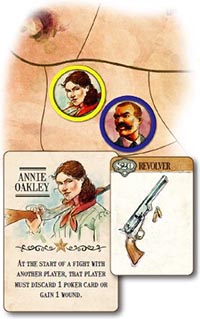
Declaration
Bass decides to discard a poker card from hand.
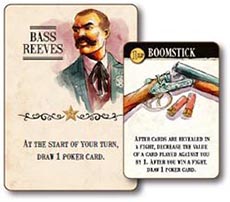
Reveal

Reward
D. Take a Location Action
D1. General Store:

D2. Play Poker:

Poker Hands from Highest to Lowest
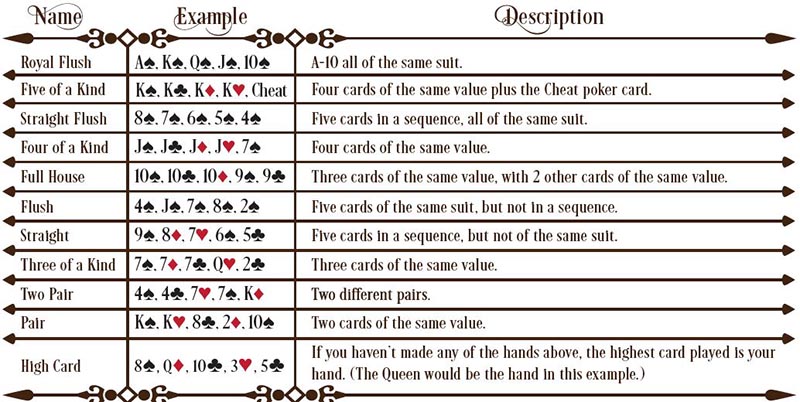
D3. Prospect for Gold:


Gold Nugget

Tailings

Gold Dust

Gravel
D4. Deposit Nuggets:

D5. Heist:

Guard Fight
D6. Heal:

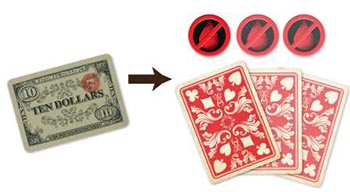
D7. Revel:

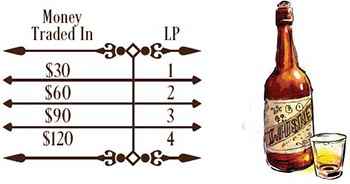

 Cattle tokens can be delivered in one of the two following ways:
Cattle tokens can be delivered in one of the two following ways:

D9. Work:

End of Turn Phase
Story Cards
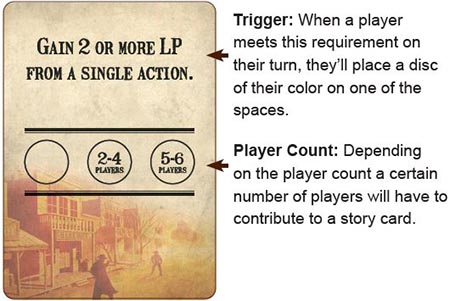
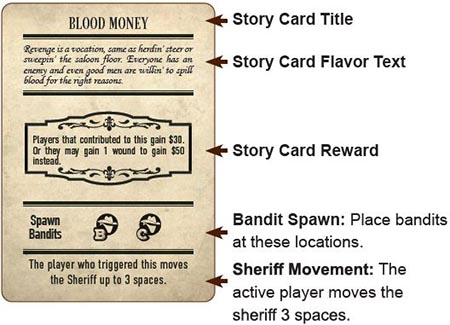
Marshal/Wanted Points
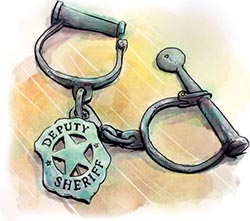
Marshal Points
Marshal Track Advancement Example
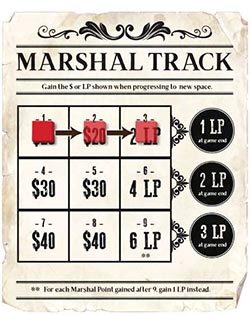
Wanted Points
Wanted Track Advancement Example
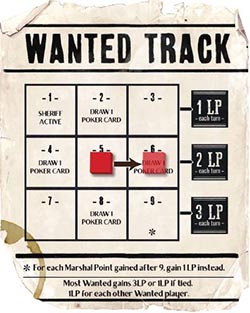
Bandits/Sheriff
The steps for a Bandit Fight are as follows:
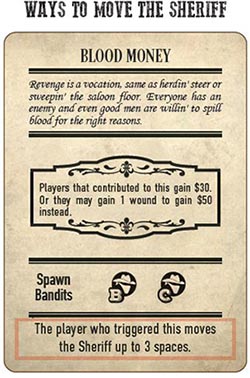
 Player vs Sheriff: The Sheriff starts the game at the Sheriff's Office space in Darkrock.
Player vs Sheriff: The Sheriff starts the game at the Sheriff's Office space in Darkrock.
The steps for an arrest attempt with the Sheriff are as follows:
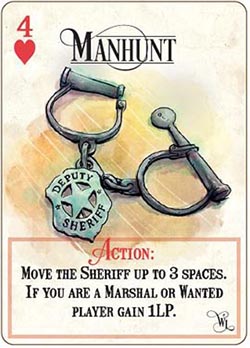
Using an action to play Manhunt
Item Cards
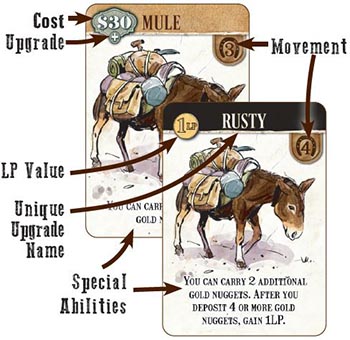
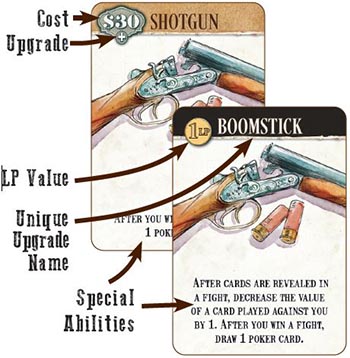
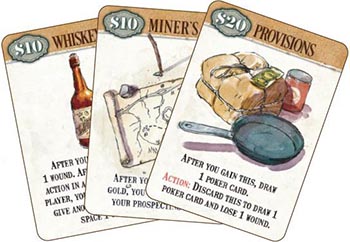
Poker Cards
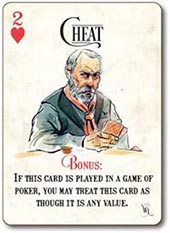
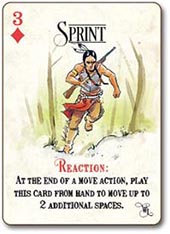
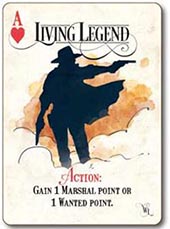
Wounds
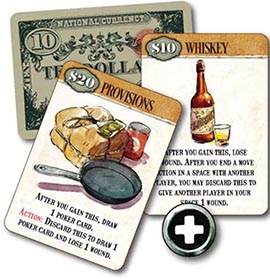
End of the Game
End of Game Final Turn Examples
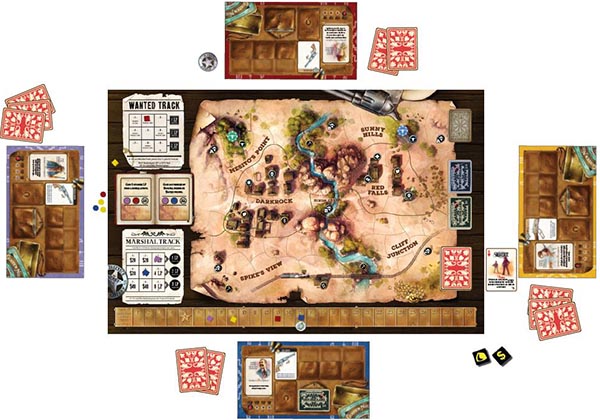
Rules Clarifications
Continue Reading

